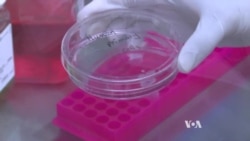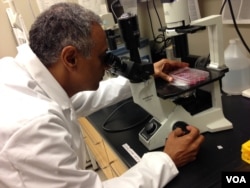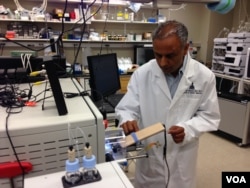Planned Parenthood, a U.S. government-funded women’s health care organization, has been making headlines after an anti-abortion group released several undercover videos that show some of its employees discussing the availability of aborted fetal tissue for medical research.
The heavily edited videos were secretly recorded and released by members of the Center for Medical Progress, an anti-abortion group.
Group members, posing as medical researchers, met with Planned Parenthood officials and said they were interested in buying fetal tissue for research.
The group claims the videos show employees of Planned Parenthood, which primarily provides women with basic health care services but also abortions, discussed the selling of fetal tissue with them.
Planned Parenthood President Cecile Richards vehemently denied the charge.
"I want to be really clear," she said in a recent video statement. "The allegation that Planned Parenthood profits in any way from tissue donation is not true.”
"Our donation programs, like any other quality health care providers, follow all laws and ethical guidelines,” she added.
It is illegal to profit from fetal tissue donations in the U.S., but organizations like Planned Parenthood may provide fetal tissue for medical research if the mother gives her consent.
Organizations can also request reimbursement for related expenses, such as the collection, storage and shipping of the tissue.
Fetal tissue in research
The use of fetal tissue in medical research has reignited a politically charged debate between anti-abortion supporters and those who believe in a woman’s right to choose, with politicians weighing in on both sides of the issue.
Conservative legislators are among those Americans who say that abortion, and the harvesting of fetal tissue for medical research, is simply wrong.
“This is an issue about our humanity," said Tim Scott, a Republican senator representing South Carolina.
And Senator Joni Ernst, a Republican representing Iowa, said she believes “Planned Parenthood is harvesting the body parts of unborn babies.”
But medical researchers in the U.S. have been working with fetal tissue for decades. It has helped in the development of the polio vaccine, and it's helping treat diseases like Parkinson’s and AIDS today.
A recent survey by a leading biotech publication revealed that at least 19 percent of respondents from academic labs and about 10 percent from industrial labs said they used fetal tissue for research.
Benefits of fetal tissue
Molecular biologist Akhilesh Pandey uses fetal tissue in his lab at Johns Hopkins University in Baltimore, Maryland.
“I feel that we are benefiting from many advances that have come out of research into fetal tissue," he said, "like pregnancy tests, like biomarkers for early detection of cancer, treatments for sickle cell disease.”
Pandey noted that a primary benefit of using fetal cells is their ability to grow and replace cells that have been lost in adults because of disease.
“If we take adult cells, they die very quickly," he explained. "When you take cells from the fetus, they have this enormous capacity to multiply."
So in other words, when fetal cells are injected into the human brain, heart or joints, he said, "they have properties that might be able to heal ... especially disorders that are caused by aging, but also other diseases.”
But some abortion opponents say using tissue from aborted fetuses is unethical.
Arina Grossu, director of the Center for Human Dignity at the Family Research Council in Washington, said fetal cells "derived either from a preterm baby or, for example, umbilical cord blood cells after a woman has given birth can be used, as well as in the case of miscarriage," she said. "But in cases where a child had to die in the process, or be killed for those tissue pieces to be used, that's not ethical."
"We have to find ways to do research using ethical means, alternative modern medicine," she added.
But if abortion laws are overturned or abortion clinics closed down, as has been happening in some conservative-leaning states across the U.S., Pandey said scientists would have limited options.
“I think it will set us back many years. And unfortunately, in the extreme case, it may take us more than many, many decades because we are not sure what processes that happen in fetal tissue during development can be re-created by other means.”
Several congressional committees have launched investigations into whether Planned Parenthood sells fetal tissue for profit.
While the public debate over the source of fetal tissue continues, scientists like Pandey will continue working with the adaptable cells to develop vaccines and potential cures for countless numbers of debilitating diseases.







